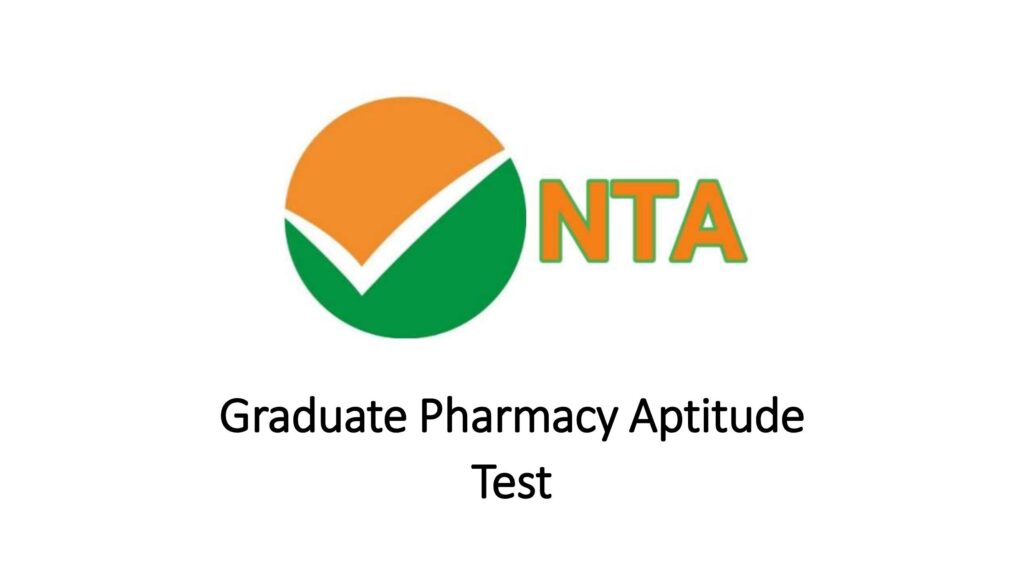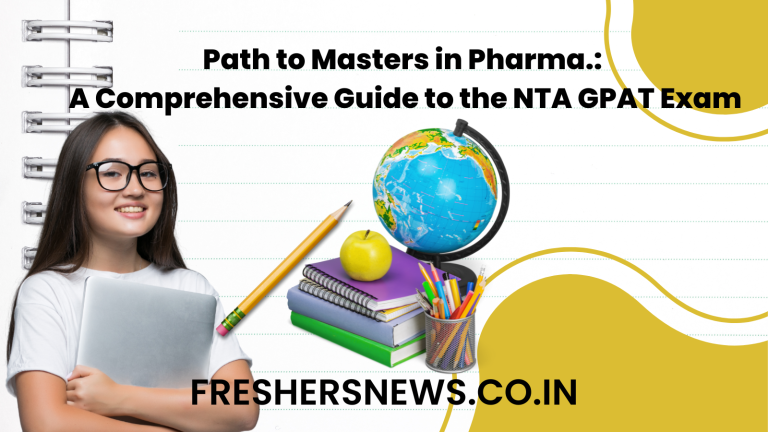Dreaming of a pleasing profession in Pharmacy? Then, the Graduate Pharmacy Aptitude Test [ conducted by the National Testing Agency] exam is your gateway to making your desire a reality! Let’s dive into the blog regarding Path to Masters in Pharma.: A Comprehensive Guide to the NTA GPAT Exam This critical examination ensures your preparation closer to a brighter future is well-informed and well-prepared.

Here, we are talking about the Path to Master in Pharma.: A Comprehensive Guide to the NTA GPAT Exam:
Eligibility Criteria
- Possess a bachelor’s degree in pharmacy (B.Pharm.) from a recognized university.
- Secure a minimum aggregate of 55% marks in your B.Pharm (50% for SC/ST/PwD categories).
- Be an Indian citizen or a Person of Indian Origin (PIO) or Overseas Citizen of India (OCI), fulfilling additional requirements.
Exam Pattern
- The Computer-Based Test (CBT) was conducted in two shifts.
- Three hours in duration, with 120 objective-type questions.
- Divided into five sections-> pharmaceutics, pharmacology, pharmacognosy, chemistry, and biochemistry.
- Each correct answer carries 4 marks, with 1 for each incorrect answer.
Important Dates
- Application Dates-> Usually announced in December, with a deadline in January.
- Exam Dates-> Typically held in February.
- Admit Card Download-> Available one week before the exam.
- Result Declaration-> Within a month after the exam.
How to prepare for the NTA GPAT
- Understand the syllabus and examination pattern.
It is essential to have a clear concept regarding “what to study.” & “How it will be asked?”
- Create a study plan.
Once you have the perfect materials, you must create a study plan. This will assist you to remain on track and cover all the crucial topics. Your study layout has to be realistic and achievable, and it is necessary to plan practical time for every analysis of a new topic and revise what you have already learned.
- Self-Study or Coaching.
The most common questions in students’ minds are how to prepare for the GPAT exam and whether to take coaching. The best decision will be a combination of both. Now, GPAT is not something you have included in your school curriculum. Therefore, coaching will guide your preparation by providing relevant study materials and tests. Then, you can solve exercises and review materials to study independently.
- Work on fundamentals.
Developing fundamental concepts should be prioritized before progressing to GPAT exam-level questions. So, focus on studying basic concepts and practice easy questions first. Then, gradually move on to higher-level questions.
- Practice lots of questions.
After completing a topic, practice asking as many questions as possible. Move from lower to higher-difficulty questions. Reviewing the concepts a few times through practice can help you prepare for the GPAT exam.
- Analysis of test
A practice test is a simulation of the actual test. So, as the exam approaches, taking practice tests regularly should be a part of your GPAT preparation strategy. Additionally, it is equally important to analyze your simulations and identify your weaknesses.
- Practice regularly
One of the best approaches to put together for the GPAT examination is to practice answering questions regularly. You can do this by solving exercise papers and taking mock tests. Many unique exercise papers and mock tests are available online and in books.
- Stay motivated.
It is essential to be stable, active, and motivated throughout your preparation.
About the syllabus of the NTA GPAT exam
Pharmaceutics – 50 questions
- Physical Pharmacy-> disperse systems, solutions, dosage forms, adsorption, stability, and drug transport across membranes.
- Biopharmaceuticals-> drug absorption, distribution, metabolism, excretion (ADME), bioavailability, controlled release dosage forms.
- Pharmaceutical Engineering-> Unit operations, equipment, and manufacturing processes for various dosage forms.
- Industrial Pharmacy-> Quality Control, Good Manufacturing Practices (GMP), Pilot Plant Scale-Up, Technology Transfer.
Pharmacology – 40 Questions
- General Pharmacology-> Drug receptors, mechanisms of action, drug interactions, adverse effects, pharmacodynamics, and pharmacokinetics.
- Systemic Pharmacology-> Cardiovascular, respiratory, central nervous, gastrointestinal, endocrine, genitourinary, and other systems.
- Clinical Pharmacology-> Clinical trials, pharmacotherapy of significant diseases, pharmacogenomics.
- Toxicology-> acute and chronic toxicity, heavy metals, pesticides, drug dependence.
Pharmacognosy – 15 questions
- General Pharmacognosy-> Cultivation, collection, processing, and identification of medicinal plants.
- Crude Drugs-> Morphology, anatomy, phytochemistry, and medicinal properties of necessary oil drugs.
- Natural Products-> Isolation, purification, and characterization of alkaloids, glycosides, tannins, flavonoids, and other classes of natural products.
- Traditional Systems of Medicine-> Ayurveda, Unani, Siddha, Homeopathy, and Their Principles.
Chemistry – 10 questions
- Organic Chemistry-> Reaction mechanisms, stereochemistry, heterocyclic compounds, synthetic methods for essential drugs.
- Physical Chemistry-> Chemical thermodynamics, kinetics, solutions, electrochemistry, spectroscopy.
- Analytical Chemistry-> Quantitative analysis, chromatographic techniques, and instrumental analysis for drug analysis.
- Inorganic Chemistry-> Coordination compounds, bioinorganic chemistry, essential drugs with inorganic character.
Biochemistry •5 Questions•
- Carbohydrates, Lipids, and Proteins: Structure, Function, Metabolism, and Their Role in Drug Action.
- Nucleic acids, vitamins, and enzymes: DNA replication, genetic code, vitamin deficiencies, enzyme kinetics, and inhibitors.
- Metabolic Pathways: Glycolysis, Krebs cycle, oxidative phosphorylation, amino acid metabolism, hormone action.
- Clinical Biochemistry: Diagnostic markers, liver function tests, kidney function tests, and other biochemical investigations.
Which books should I prefer for the NTA GPAT exam?
Pharmaceutics
- Remington: The Science and Practice of Pharmacy
- Lachman and Lieberman’s Principles of Pharmaceutical Science
- Leon Lachman’s Modern Industrial Pharmacy
Pharmacology
- Goodman & Gilman’s The Pharmacological Basis of Therapeutics
- Lippincott Illustrated Reviews: Pharmacology
- Rang & Dale’s Pharmacology
Pharmacognosy
- Trease and Evans’ pharmacognosy
- Michael PJ Brown’s Natural Product Chemistry
- Kokate CK’s Pharmacognosy
Chemistry
- Morrison & Boyd’s Organic Chemistry
- Atkins’ Physical Chemistry
- Vogel’s Textbook of Quantitative Chemical Analysis
Biochemistry
- Lehninger Principles of Biochemistry
- Harper’s Illustrated Biochemistry
- Lippincott Illustrated Reviews: Biochemistry
GPAT-Focused Resources:
- A Companion to GPAT by Nazma N. Inamdar
- The Pearson Guide to GPAT and Other Entrance Examinations in Pharmacy by Akaberi Shah Baser
- Synopsis for GPAT by Dr. Surendra H. Bodakhe
- Dr. P.K. Ghosh’s Objective Type MCQs in Pharmaceutical Chemistry
- Dr. B. Suresh’s Objective-Type MCQs in Pharmacology and Pharmacotherapeutics
Common mistakes to avoid in the NTA GPAT
- Not analyzing the examination pattern, questions, and syllabus: It is vital to have a clear concept regarding the study program and which topics to focus on.
- Not managing time effectively: Time management is essential in any competitive exam.
- Not practicing regularly: One of the excellent methods to put together for the GPAT examination is to practice answering questions regularly.
- Making common mistakes: In any competitive exam, it is crucial to concentrate and keep away from making careless mistakes.
- Not focusing on weak areas: As you practice answering questions, you will become aware of your weak areas.
FAQs
How competitive is the NTA GPAT exam, and what marks are considered good?
The NTA GPAT is moderately competitive, with many aspirants preparing for their seats. An excellent mark usually falls above the 50th percentile. Aiming for marks above 350 will let you achieve top college.
Are extracurricular things and research experience essential for admissions?
While this is not the first phase of the GPAT score, vigorous extracurricular activities and research can enhance your chances of getting an M.Pharma. Programs. They examine your well-roundedness, passion for the field, and potential for future research. Mention your achievements in your interviews.
Are there any scholarship options/ schemes available for M.Pharm. students?
Several scholarships and economic resource preferences are available for M.Pharm. students, each merit-based and need-based. Some possibilities include research scholarships from government authorities like UGC or CSIR, college-specific scholarships, and bank loans.
What are some career options after M.Pharm.?
The M.Pharm. opens doorways to various professional paths other than research. You can work for pharmaceutical businesses in roles like drug discovery, formula development, quality control, or regulatory affairs.
Mention the strategies to remain updated in the pharmaceutical field.
- Analyzing scientific journals,
- Attend conferences & workshops,
- comply with enterprise news,
- Engage with professionals in some ways.
- Visit online sources for e-papers, news, etc.
Conclusion
As you embark on your NTA GPAT journey, remember it is a marathon, not a sprint. With a strategic plan, proper resources, and unwavering dedication, you can triumph over the syllabus, grasp the examination format, and achieve your M.Pharm. dream. Accept the challenge, believe in yourself, and use the understanding and assistance in this blog. So, take a deep breath, face the examination with confidence, and remember, the key to success lies now, not simply in education but additionally in perseverance and an unwavering belief in your potential. Go forth, future pharmacists, and ace the NTA GPAT!

